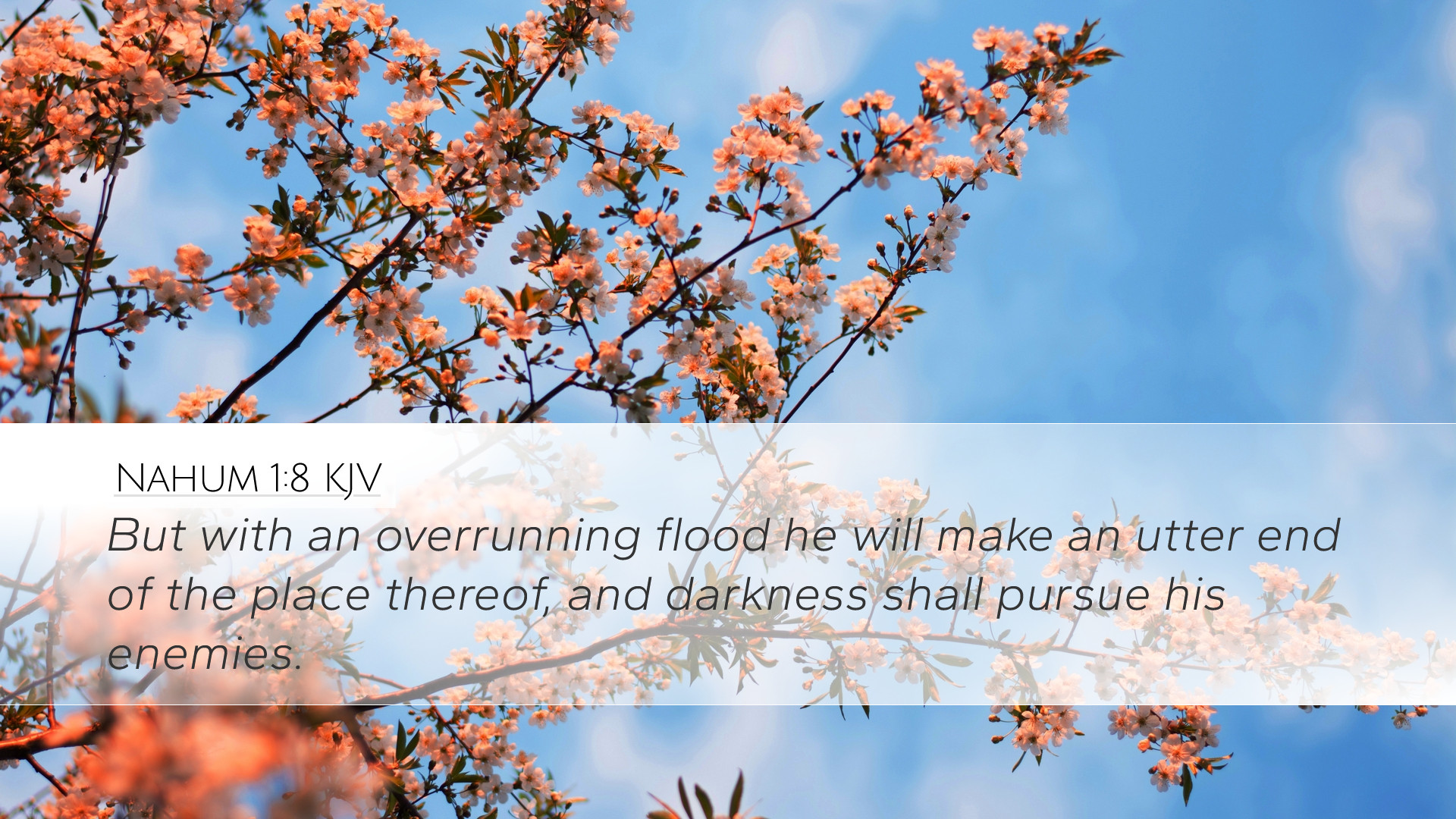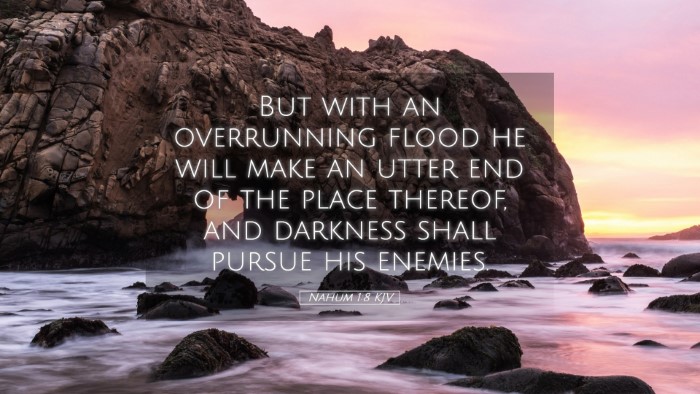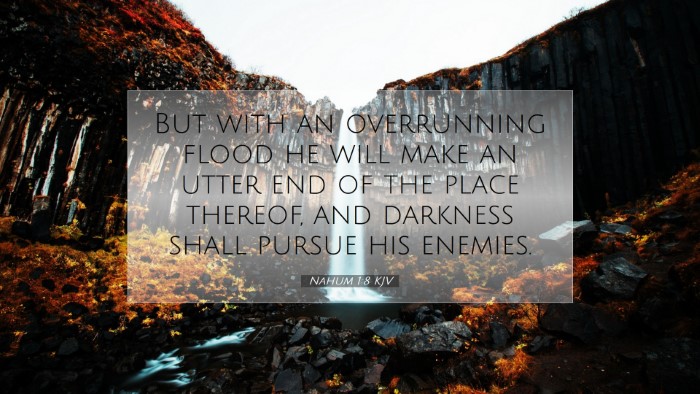Old Testament
Genesis Exodus Leviticus Numbers Deuteronomy Joshua Judges Ruth 1 Samuel 2 Samuel 1 Kings 2 Kings 1 Chronicles 2 Chronicles Ezra Nehemiah Esther Job Psalms Proverbs Ecclesiastes Song of Solomon Isaiah Jeremiah Lamentations Ezekiel Daniel Hosea Joel Amos Obadiah Jonah Micah Nahum Habakkuk Zephaniah Haggai Zechariah MalachiNahum 1:8
Nahum 1:8 KJV
But with an overrunning flood he will make an utter end of the place thereof, and darkness shall pursue his enemies.
Nahum 1:8 Bible Commentary
Commentary on Nahum 1:8
Introduction
Nahum 1:8 states, "But with an overrunning flood He will make an utter end of the place thereof, and darkness shall pursue His enemies." This verse stands as a powerful declaration of God's impending judgment upon Nineveh and, by extension, a profound revelation of divine retribution against unrepentant nations. In this commentary, we will synthesize insights from public domain commentators like Matthew Henry, Albert Barnes, and Adam Clarke to deepen the understanding of this pivotal scripture.
Context of Nahum
Nahum, a prophet during the 7th century BCE, prophesied the destruction of Nineveh, the capital of Assyria. This city had been a symbol of cruelty and idolatry. The book opens with a description of God’s nature: the Lord is jealous and avenging, full of wrath. His justice towards the wicked is juxtaposed with His goodness towards those who trust in Him. This context sets the stage for verse 8, illustrating God's judgment as inevitable and devastating.
Divine Judgment and Destruction
Interpretation of "Overrunning Flood"
Henry describes the "overrunning flood" as a metaphor for the overwhelming destruction that would befall Nineveh. This imagery suggests not merely a natural disaster, but an unstoppable force of divine wrath that sweeps away any semblance of stability or safety the city might possess.
- Albert Barnes echoes this sentiment, emphasizing the certainty of the flood's coming. He notes that floodwaters, once unleashed, are indiscriminate and devouring, reflecting how God's judgment, like a flood, does not spare the wicked.
- Adam Clarke elaborates on the metaphor, linking it to historical instances of judgment where such floods have represented divine intervention that led to total annihilation of nations, suggesting a complete and untiring effort on God's part to eliminate evildoers.
The Nature of God's Judgment
Utter End of the Place
The phrase "make an utter end of the place thereof" indicates a total destruction that leaves no remnant. Henry comments on the finality of this action, explaining that it signifies God's complete disapproval of the practices and beliefs of those living in Nineveh.
- Barnes states that the destruction of Nineveh was also symbolic of the fate that awaits all nations which defy God’s authority. He points to the history of Assyria as a warning sign of the consequences of sin.
- Clarke highlights that the judgment against Nineveh serves as a prophetic warning to all nations. He emphasizes that God's justice, though delayed, is assured and often comes as a result of patience with sin before the floodgate of wrath opens.
Spiritual Darkness Pursuing Enemies
The subsequent phrase, "and darkness shall pursue His enemies," conveys a poignant image of despair. This darkness represents the spiritual state of those against God.
- Henry reflects on the idea of darkness in a spiritual sense; just as physical darkness can grip and hinder progress, so too does spiritual darkness prevent understanding and deliverance from impending doom.
- Barnes takes this further by suggesting that darkness symbolizes the abandonment of divine favor. The enemies of God, engulfed in such darkness, are devoid of hope and clarity, leading them into deeper depravity.
- Clarke posits that the pursuit of darkness signifies relentless torment. It illustrates that the consequences of one’s rebellion against God will ultimately lead to despair and separation from divine grace.
Theological Implications
God’s Justice and Mercy
Nahum 1:8 encapsulates profound theological themes concerning God’s nature, justice, and the destiny of nations.
- The assurance of God's judgment on Nineveh serves as a reminder of His sovereignty over all nations and their ultimate accountability to Him.
- These verses underline the tension between God's mercy and His justice. While He offers grace to those who repent, His patience has limits, and His judgment is necessary for upholding righteousness.
Application for Today
Warnings to Nations and Individuals
The lessons from Nahum 1:8 resonate today; they serve as warnings against pride, idolatry, and injustice. As leaders and individuals navigate moral and ethical dilemmas, the pursuit of righteousness and justice remains paramount.
- Pastors and theologians can apply these insights to discuss the nature of God's justice in their teachings, warning congregants of the consequences of unrepentant sin.
- Students of theology are encouraged to reflect on the significance of divine judgment throughout scripture as they study the consequences faced by nations that turn away from God.
Conclusion
Nahum 1:8 is a vivid portrayal of divine judgment within the framework of prophetic literature. As we combine insights from Matthew Henry, Albert Barnes, and Adam Clarke, we see a comprehensive picture of God’s righteous wrath against iniquity, balanced by His desire for humanity to turn toward Him in repentance. This verse serves as both a cautionary tale and a hopeful reminder of God’s ultimate authority over history and His desire not for destruction but for reconciliation.


